人教版2019高中选修3 Unit 5 Poems 单元知识总结清单(含练习题和书面表达句式及范文)
文档属性
| 名称 | 人教版2019高中选修3 Unit 5 Poems 单元知识总结清单(含练习题和书面表达句式及范文) |
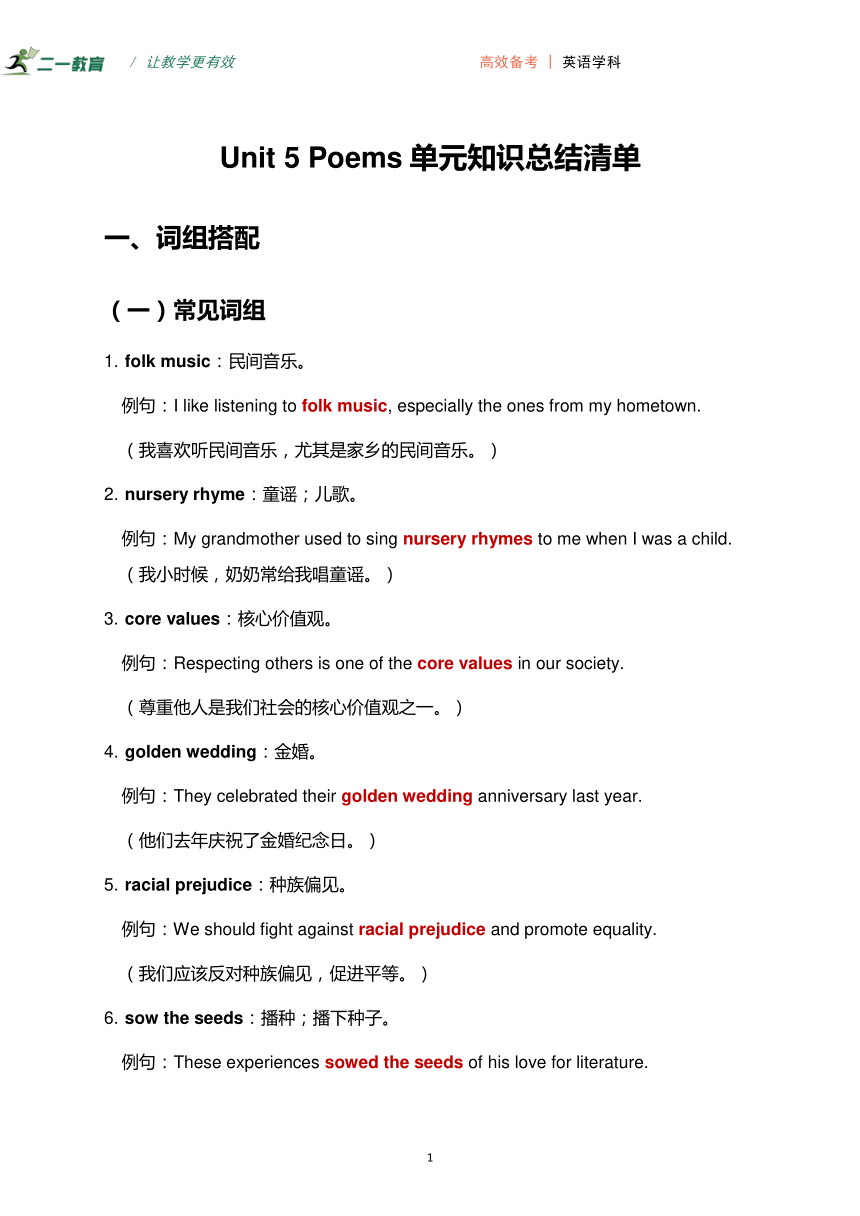
|
|
| 格式 | docx | ||
| 文件大小 | 43.7KB | ||
| 资源类型 | 试卷 | ||
| 版本资源 | 人教版(2019) | ||
| 科目 | 英语 | ||
| 更新时间 | 2025-07-14 00:00:00 | ||
图片预览

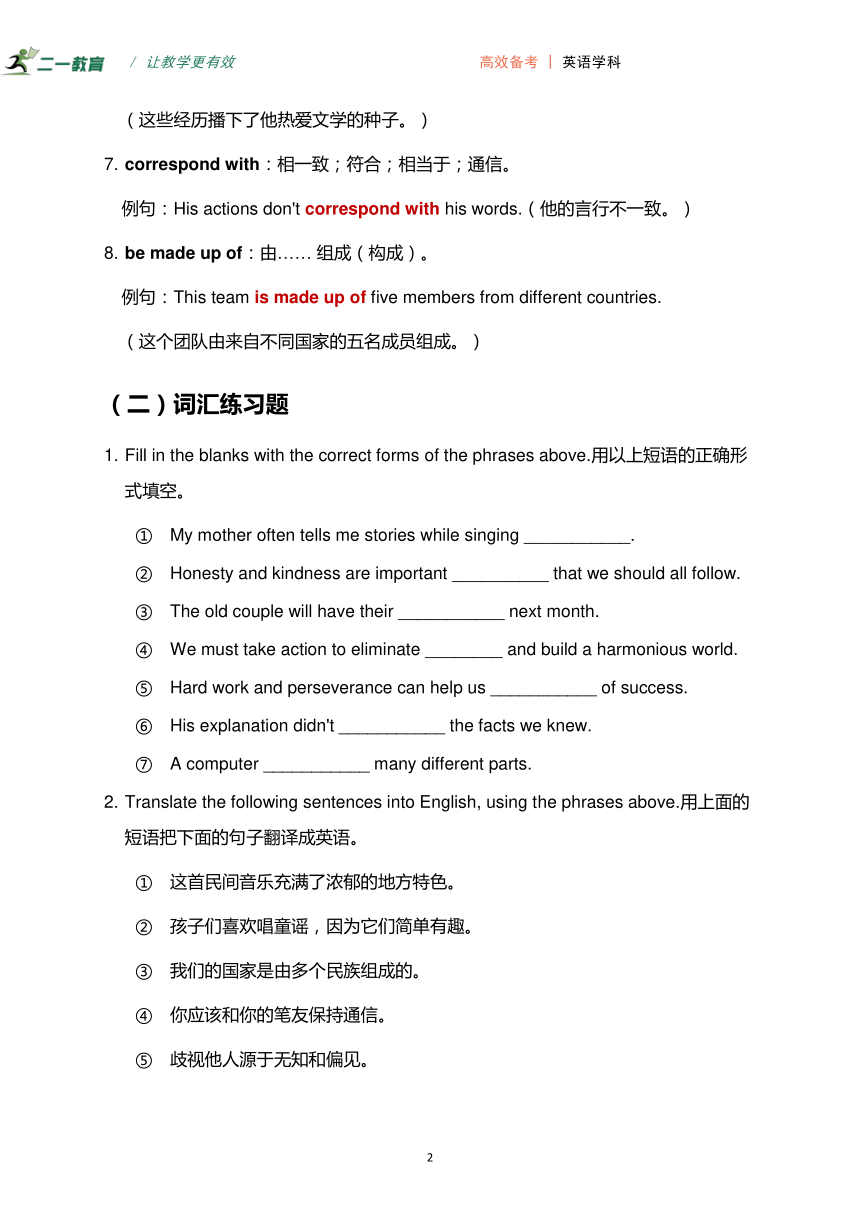
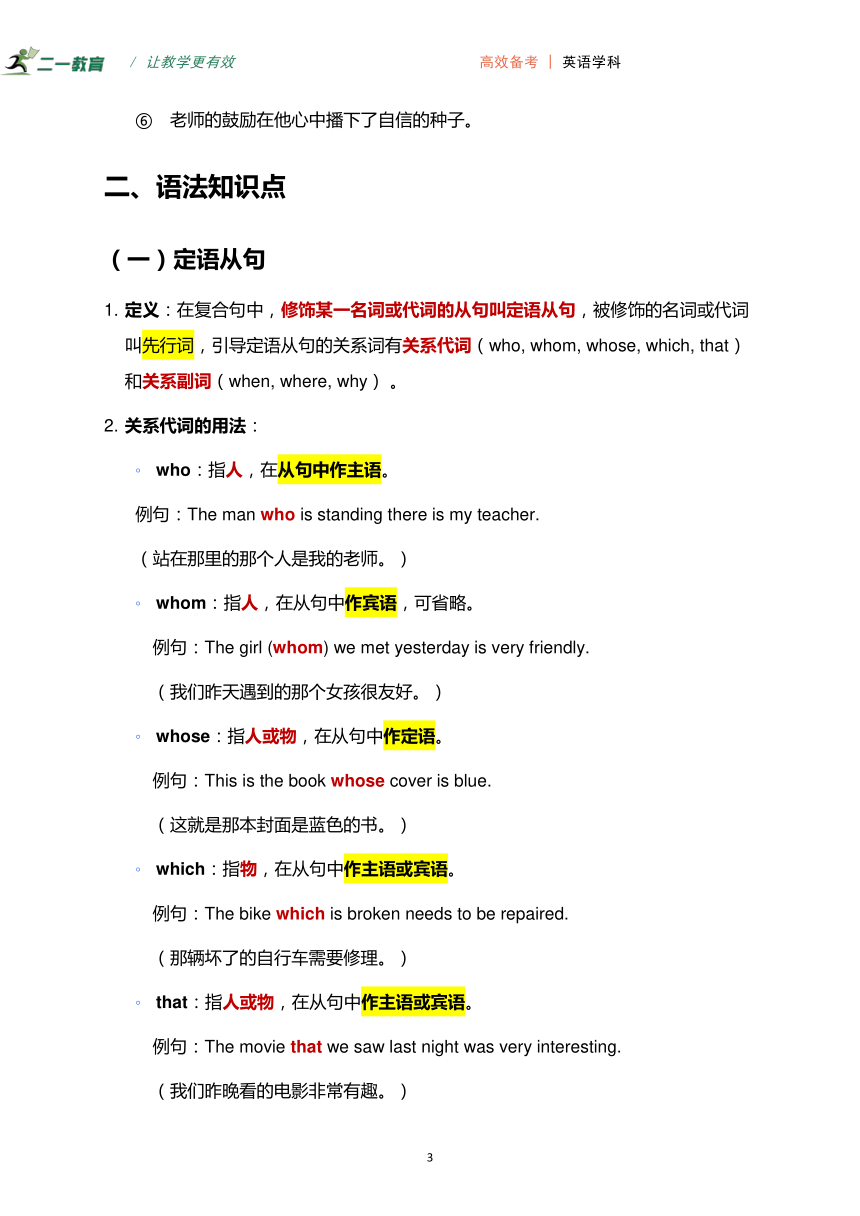
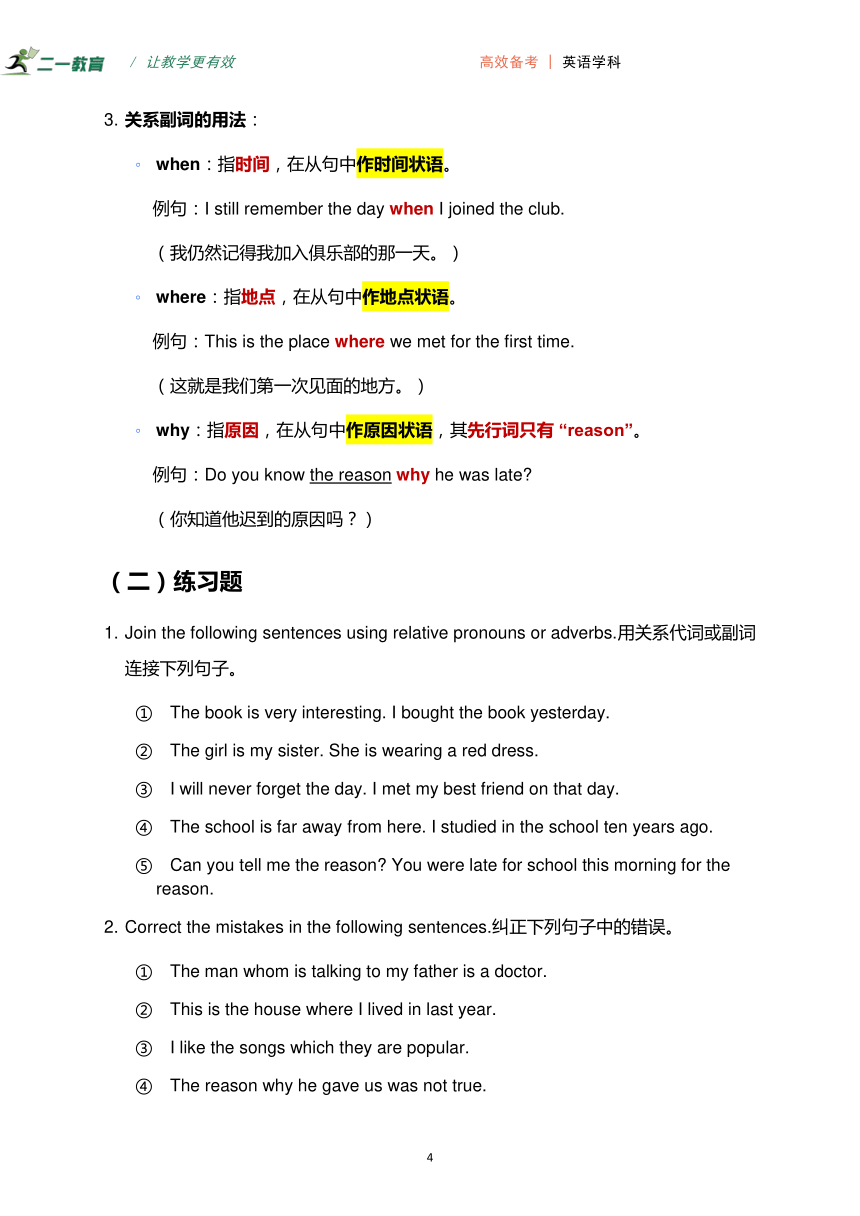
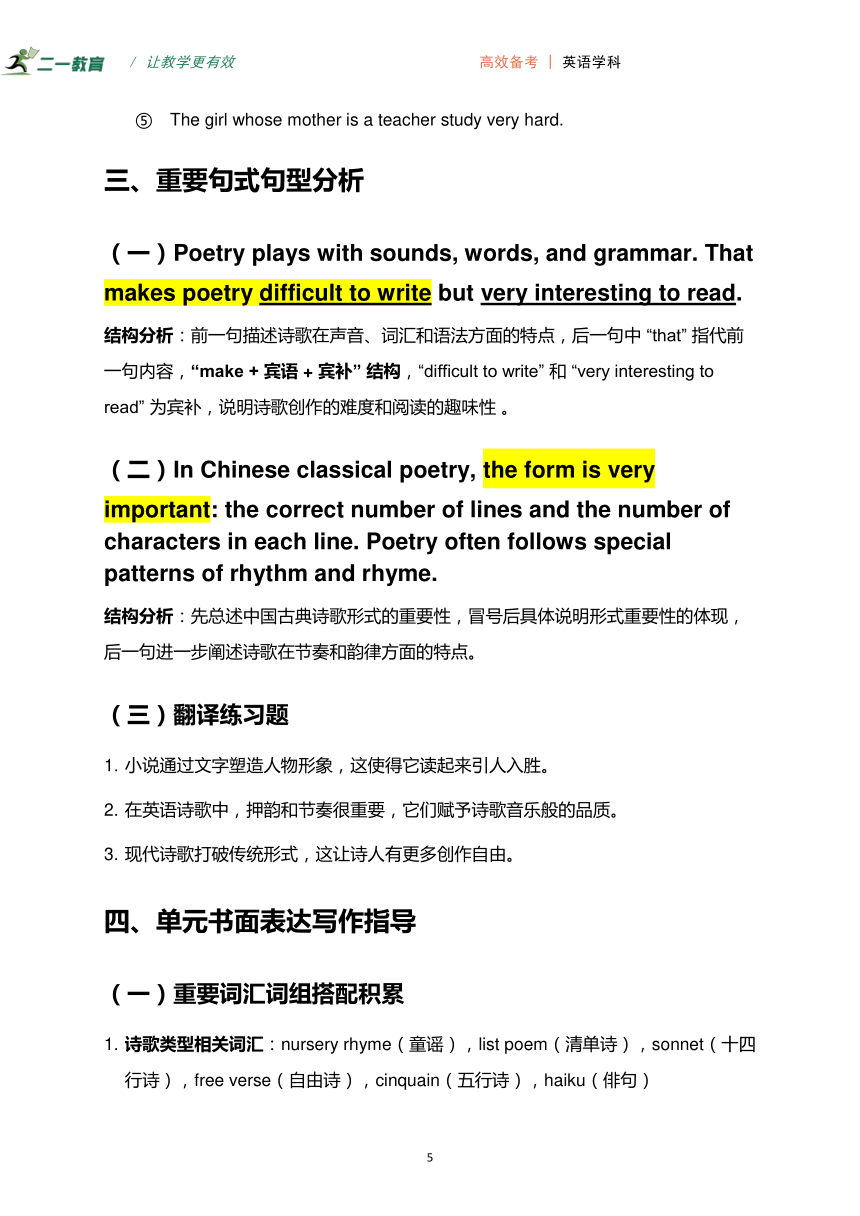
文档简介
/ 让教学更有效 高效备考 | 英语学科
Unit 5 Poems单元知识总结清单
一、词组搭配
(一)常见词组
folk music:民间音乐。
例句:I like listening to folk music, especially the ones from my hometown.
(我喜欢听民间音乐,尤其是家乡的民间音乐。)
nursery rhyme:童谣;儿歌。
例句:My grandmother used to sing nursery rhymes to me when I was a child.(我小时候,奶奶常给我唱童谣。)
core values:核心价值观。
例句:Respecting others is one of the core values in our society.
(尊重他人是我们社会的核心价值观之一。)
golden wedding:金婚。
例句:They celebrated their golden wedding anniversary last year.
(他们去年庆祝了金婚纪念日。)
racial prejudice:种族偏见。
例句:We should fight against racial prejudice and promote equality.
(我们应该反对种族偏见,促进平等。)
sow the seeds:播种;播下种子。
例句:These experiences sowed the seeds of his love for literature.
(这些经历播下了他热爱文学的种子。)
correspond with:相一致;符合;相当于;通信。
例句:His actions don't correspond with his words.(他的言行不一致。)
be made up of:由…… 组成(构成)。
例句:This team is made up of five members from different countries.
(这个团队由来自不同国家的五名成员组成。)
(二)词汇练习题
Fill in the blanks with the correct forms of the phrases above.用以上短语的正确形式填空。
My mother often tells me stories while singing ___________.
Honesty and kindness are important __________ that we should all follow.
The old couple will have their ___________ next month.
We must take action to eliminate ________ and build a harmonious world.
Hard work and perseverance can help us ___________ of success.
His explanation didn't ___________ the facts we knew.
A computer ___________ many different parts.
Translate the following sentences into English, using the phrases above.
用上面的短语把下面的句子翻译成英语。
这首民间音乐充满了浓郁的地方特色。
孩子们喜欢唱童谣,因为它们简单有趣。
我们的国家是由多个民族组成的。
你应该和你的笔友保持通信。
歧视他人源于无知和偏见。
老师的鼓励在他心中播下了自信的种子。
二、语法知识点
(一)定语从句
定义:在复合句中,修饰某一名词或代词的从句叫定语从句,被修饰的名词或代词叫先行词,引导定语从句的关系词有关系代词(who, whom, whose, which, that)和关系副词(when, where, why) 。
关系代词的用法:
who:指人,在从句中作主语。
例句:The man who is standing there is my teacher.
(站在那里的那个人是我的老师。)
whom:指人,在从句中作宾语,可省略。
例句:The girl (whom) we met yesterday is very friendly.
(我们昨天遇到的那个女孩很友好。)
whose:指人或物,在从句中作定语。
例句:This is the book whose cover is blue.
(这就是那本封面是蓝色的书。)
which:指物,在从句中作主语或宾语。
例句:The bike which is broken needs to be repaired.
(那辆坏了的自行车需要修理。)
that:指人或物,在从句中作主语或宾语。
例句:The movie that we saw last night was very interesting.
(我们昨晚看的电影非常有趣。)
关系副词的用法:
when:指时间,在从句中作时间状语。
例句:I still remember the day when I joined the club.
(我仍然记得我加入俱乐部的那一天。)
where:指地点,在从句中作地点状语。
例句:This is the place where we met for the first time.
(这就是我们第一次见面的地方。)
why:指原因,在从句中作原因状语,其先行词只有 “reason”。
例句:Do you know the reason why he was late
(你知道他迟到的原因吗?)
(二)练习题
Join the following sentences using relative pronouns or adverbs.
用关系代词或副词连接下列句子。
The book is very interesting. I bought the book yesterday.
The girl is my sister. She is wearing a red dress.
I will never forget the day. I met my best friend on that day.
The school is far away from here. I studied in the school ten years ago.
Can you tell me the reason You were late for school this morning for the reason.
Correct the mistakes in the following sentences.纠正下列句子中的错误。
The man whom is talking to my father is a doctor.
This is the house where I lived in last year.
I like the songs which they are popular.
The reason why he gave us was not true.
The girl whose mother is a teacher study very hard.
三、重要句式句型分析
(一)Poetry plays with sounds, words, and grammar. That makes poetry difficult to write but very interesting to read.
结构分析:前一句描述诗歌在声音、词汇和语法方面的特点,后一句中 “that” 指代前一句内容,“make + 宾语 + 宾补” 结构,“difficult to write” 和 “very interesting to read” 为宾补,说明诗歌创作的难度和阅读的趣味性 。
(二)In Chinese classical poetry, the form is very important: the correct number of lines and the number of characters in each line. Poetry often follows special patterns of rhythm and rhyme.
结构分析:先总述中国古典诗歌形式的重要性,冒号后具体说明形式重要性的体现,后一句进一步阐述诗歌在节奏和韵律方面的特点。
(三)翻译练习题
小说通过文字塑造人物形象,这使得它读起来引人入胜。
在英语诗歌中,押韵和节奏很重要,它们赋予诗歌音乐般的品质。
现代诗歌打破传统形式,这让诗人有更多创作自由。
四、单元书面表达写作指导
(一)重要词汇词组搭配积累
诗歌类型相关词汇:nursery rhyme(童谣),list poem(清单诗),sonnet(十四行诗),free verse(自由诗),cinquain(五行诗),haiku(俳句)
诗歌特点相关词汇:rhyme(押韵),rhythm(节奏),imagery(意象),literary devices(文学手法),descriptive language(描写性语言),vivid(生动的)
情感与表达相关词汇:sorrow(悲伤),joy(喜悦),sympathy(同情),convey feelings(传达情感),express oneself(表达自己)
其他相关词汇:compose poetry(创作诗歌),recite(背诵),appreciate(欣赏),translation(翻译)
(二)高分句式积累
It is + adj. + for sb. to do sth.
例句:It is meaningful for us to learn and appreciate different forms of poetry.
(对我们来说,学习和欣赏不同形式的诗歌是有意义的。)
Not only...but also...
例句:Poetry can not only convey rich emotions but also reflect the social and cultural background.(诗歌不仅能传达丰富的情感,还能反映社会文化背景。)
With + 名词 + 现在分词 / 过去分词 / 介词短语 。
例句:With the development of literature, more and more forms of poetry come into being.(随着文学的发展,越来越多的诗歌形式应运而生。)
What + 主语 + need/require/want is...
例句:What a good poem needs is beautiful language and deep meaning.
(一首好诗所需要的是优美的语言和深刻的内涵。)
(三)参考范文
My Love for Poetry
Poetry is a wonderful form of literature that has the power to touch people's hearts. It uses beautiful words, vivid images, and unique rhythms to express various feelings and ideas.
I have a deep love for poetry, especially Chinese classical poetry. In Chinese classical poetry, the form is very important. For example, in Tang poems, the number of lines and characters in each line often follows certain rules, and the poems are full of beautiful rhythms and rhymes. Li Bai's poems, with their romantic style, can always take me to a wonderful world. His description of nature and friendship makes me feel the beauty of life. Du Fu's poems, on the other hand, reflect the social reality and people's suffering at that time, which makes me understand history better and feel the poet's deep sympathy for the people.
Modern poetry also attracts me a lot. It breaks the traditional forms, giving poets more freedom to express themselves. Through modern poetry, I can feel the poets' unique views on life and the world.
In my opinion, reading and writing poetry are great ways to improve our language ability and emotional intelligence. It allows us to express our innermost feelings and thoughts. I hope more people can fall in love with poetry and enjoy the beauty it brings.
一、词组搭配练习题答案及解析
(一)Fill in the blanks with the correct forms of the phrases above
答案:nursery rhymes
解析:“My mother often tells me stories while singing...”,根据语境,妈妈讲故事时唱的通常是童谣,“nursery rhyme” 表示 “童谣;儿歌”,这里应用复数形式 “nursery rhymes”,表示多种童谣。
答案:core values
解析:“Honesty and kindness are important...that we should all follow.”,诚实和善良属于人们应遵循的重要价值观,“core values” 表示 “核心价值观”,符合句子逻辑。
答案:golden wedding
解析:“The old couple will have their...next month.”,老夫妇即将迎来的是金婚,“golden wedding” 表示 “金婚”,是固定搭配。
答案:racial prejudice
解析:“We must take action to eliminate...and build a harmonious world.”,为构建和谐世界要消除的是种族偏见,“racial prejudice” 表示 “种族偏见”,符合语境。
答案:sow the seeds
解析:“Hard work and perseverance can help us...of success.”,努力和毅力能够帮助我们为成功播下种子,“sow the seeds” 表示 “播种;播下种子”,“help sb. do sth.” 结构中,动词用原形,所以填 “sow the seeds”。
答案:correspond with
解析:“His explanation didn't...the facts we knew.”,他的解释与我们知道的事实不一致,“correspond with” 表示 “相一致;符合”,“didn't” 后接动词原形,故填 “correspond with”。
答案:is made up of
解析:“A computer...many different parts.”,句子表达计算机由许多不同部件组成,“be made up of” 表示 “由…… 组成(构成)” ,主语 “A computer” 是单数,一般现在时中 be 动词用 “is”,所以填 “is made up of”。
(二)Translate the following sentences into English, using the phrases above
答案:This folk music is full of rich local characteristics.
解析:“这首民间音乐” 翻译为 “This folk music”,“folk music” 表示 “民间音乐”;“充满” 常用 “be full of” 表达;“浓郁的地方特色” 翻译为 “rich local characteristics”。
答案:Children like singing nursery rhymes because they are simple and interesting.
解析:“孩子们” 翻译为 “Children”;“喜欢做某事” 用 “like doing sth.”,“唱童谣” 即 “singing nursery rhymes”,“nursery rhymes” 表示 “童谣;儿歌”;“因为” 用 “because” 引导原因状语从句,从句中 “它们” 指代童谣,用 “they”,“简单有趣” 翻译为 “simple and interesting”。
答案:Our country is made up of many ethnic groups.
解析:“我们的国家” 翻译为 “Our country”;“由…… 组成” 用 “be made up of”,主语是单数,be 动词用 “is”;“多个民族” 翻译为 “many ethnic groups”。
答案:You should correspond with your pen pal.
解析:“你应该” 翻译为 “You should”,“should” 后接动词原形;“和…… 通信” 用 “correspond with”;“你的笔友” 翻译为 “your pen pal”。
答案:Discriminating against others stems from ignorance and prejudice.
解析:“歧视他人” 常用 “Discriminating against others”,这里用动名词短语作主语;“源于” 可翻译为 “stems from”;“无知和偏见” 翻译为 “ignorance and prejudice”,虽然原词组中 “racial prejudice” 强调种族偏见,但在此句语境下,“prejudice” 可表示广义的偏见 。
答案:The teacher's encouragement sowed the seeds of confidence in his heart.
解析:“老师的鼓励” 翻译为 “The teacher's encouragement”;“播下…… 的种子” 用 “sowed the seeds of”,句子时态为一般过去时,“sow” 的过去式是 “sowed”;“自信” 翻译为 “confidence”;“在他心中” 翻译为 “in his heart”。
二、语法知识点练习题答案及解析
(一)Join the following sentences using relative pronouns or adverbs
答案:The book which/that I bought yesterday is very interesting.
解析:先行词是 “the book”,指物,在从句 “I bought the book yesterday” 中作宾语,所以可用关系代词 “which” 或 “that” 引导定语从句,将两句合并为 “The book which/that I bought yesterday is very interesting”。
答案:The girl who/that is wearing a red dress is my sister.
解析:先行词是 “the girl”,指人,在从句 “She is wearing a red dress” 中作主语,因此可用关系代词 “who” 或 “that” 引导定语从句,得到 “The girl who/that is wearing a red dress is my sister”。
答案:I will never forget the day when I met my best friend.
解析:先行词是 “the day”,指时间,在从句 “I met my best friend on that day” 中作时间状语,所以用关系副词 “when” 引导定语从句,合并为 “I will never forget the day when I met my best friend”。
答案:The school where I studied ten years ago is far away from here.
解析:先行词是 “the school”,指地点,在从句 “I studied in the school ten years ago” 中作地点状语,故用关系副词 “where” 引导定语从句,即 “The school where I studied ten years ago is far away from here”。
答案:Can you tell me the reason why you were late for school this morning
解析:先行词是 “the reason”,在从句 “You were late for school this morning for the reason” 中作原因状语,所以用关系副词 “why” 引导定语从句,句子为 “Can you tell me the reason why you were late for school this morning ” 。
(二)Correct the mistakes in the following sentences
答案:The man who is talking to my father is a doctor.
解析:原句中 “whom” 使用错误,先行词 “the man” 在从句 “is talking to my father” 中作主语,指人作主语时关系代词应用 “who” 或 “that”,所以将 “whom” 改为 “who”。
答案:This is the house where I lived last year. 或 This is the house which/that I lived in last year.
解析:原句中 “where” 和 “in” 重复使用错误。“where” 在定语从句中作地点状语,相当于 “in which”,所以可去掉 “in”,用 “where” 引导;或者保留 “in”,用关系代词 “which” 或 “that” 引导,此时 “in which/that” 在从句中作宾语 。
答案:I like the songs which are popular.
解析:原句中 “they” 多余,“which” 引导定语从句修饰 “the songs”,在从句 “are popular” 中作主语,所以应去掉 “they” 。
答案:The reason that/which he gave us was not true.
解析:先行词 “the reason” 在从句 “he gave us” 中作宾语,此时关系词应用 “that” 或 “which”,而 “why” 在定语从句中作原因状语,不能作宾语,所以将 “why” 改为 “that” 或 “which” 。
答案:The girl whose mother is a teacher studies very hard.
解析:原句中 “study” 形式错误,主语 “The girl” 是第三人称单数,一般现在时中谓语动词 “study” 应变为第三人称单数形式 “studies” 。
三、重要句式句型分析翻译练习题答案及解析
答案:Novels create characters through words, which makes them fascinating to read.
解析:仿照 “Poetry plays with sounds, words, and grammar. That makes poetry difficult to write but very interesting to read.” 的结构,“小说通过文字塑造人物形象” 翻译为 “Novels create characters through words”;“这使得” 用 “which makes”,“which” 指代前面整个句子内容;“读起来引人入胜” 翻译为 “fascinating to read”,使用 “make + 宾语 + 宾补” 结构 。
答案:In English poetry, rhyme and rhythm are very important, and they give poetry a musical quality.
解析:参考 “In Chinese classical poetry, the form is very important: the correct number of lines and the number of characters in each line. Poetry often follows special patterns of rhythm and rhyme.” 的结构,先阐述 “在英语诗歌中,押韵和节奏很重要”,翻译为 “In English poetry, rhyme and rhythm are very important”;然后说明 “它们赋予诗歌音乐般的品质”,翻译为 “and they give poetry a musical quality” 。
答案:Modern poetry breaks traditional forms, which gives poets more creative freedom.
解析:依据 “Poetry plays with sounds, words, and grammar. That makes poetry difficult to write but very interesting to read.” 的结构,“现代诗歌打破传统形式” 翻译为 “Modern poetry breaks traditional forms”;“这让” 用 “which gives”,“which” 指代前面句子内容;“诗人有更多创作自由” 翻译为 “poets more creative freedom”,使用 “give + 间接宾语 + 直接宾语” 结构 。
Unit 5 Poems单元知识总结清单
一、词组搭配
(一)常见词组
folk music:民间音乐。
例句:I like listening to folk music, especially the ones from my hometown.
(我喜欢听民间音乐,尤其是家乡的民间音乐。)
nursery rhyme:童谣;儿歌。
例句:My grandmother used to sing nursery rhymes to me when I was a child.(我小时候,奶奶常给我唱童谣。)
core values:核心价值观。
例句:Respecting others is one of the core values in our society.
(尊重他人是我们社会的核心价值观之一。)
golden wedding:金婚。
例句:They celebrated their golden wedding anniversary last year.
(他们去年庆祝了金婚纪念日。)
racial prejudice:种族偏见。
例句:We should fight against racial prejudice and promote equality.
(我们应该反对种族偏见,促进平等。)
sow the seeds:播种;播下种子。
例句:These experiences sowed the seeds of his love for literature.
(这些经历播下了他热爱文学的种子。)
correspond with:相一致;符合;相当于;通信。
例句:His actions don't correspond with his words.(他的言行不一致。)
be made up of:由…… 组成(构成)。
例句:This team is made up of five members from different countries.
(这个团队由来自不同国家的五名成员组成。)
(二)词汇练习题
Fill in the blanks with the correct forms of the phrases above.用以上短语的正确形式填空。
My mother often tells me stories while singing ___________.
Honesty and kindness are important __________ that we should all follow.
The old couple will have their ___________ next month.
We must take action to eliminate ________ and build a harmonious world.
Hard work and perseverance can help us ___________ of success.
His explanation didn't ___________ the facts we knew.
A computer ___________ many different parts.
Translate the following sentences into English, using the phrases above.
用上面的短语把下面的句子翻译成英语。
这首民间音乐充满了浓郁的地方特色。
孩子们喜欢唱童谣,因为它们简单有趣。
我们的国家是由多个民族组成的。
你应该和你的笔友保持通信。
歧视他人源于无知和偏见。
老师的鼓励在他心中播下了自信的种子。
二、语法知识点
(一)定语从句
定义:在复合句中,修饰某一名词或代词的从句叫定语从句,被修饰的名词或代词叫先行词,引导定语从句的关系词有关系代词(who, whom, whose, which, that)和关系副词(when, where, why) 。
关系代词的用法:
who:指人,在从句中作主语。
例句:The man who is standing there is my teacher.
(站在那里的那个人是我的老师。)
whom:指人,在从句中作宾语,可省略。
例句:The girl (whom) we met yesterday is very friendly.
(我们昨天遇到的那个女孩很友好。)
whose:指人或物,在从句中作定语。
例句:This is the book whose cover is blue.
(这就是那本封面是蓝色的书。)
which:指物,在从句中作主语或宾语。
例句:The bike which is broken needs to be repaired.
(那辆坏了的自行车需要修理。)
that:指人或物,在从句中作主语或宾语。
例句:The movie that we saw last night was very interesting.
(我们昨晚看的电影非常有趣。)
关系副词的用法:
when:指时间,在从句中作时间状语。
例句:I still remember the day when I joined the club.
(我仍然记得我加入俱乐部的那一天。)
where:指地点,在从句中作地点状语。
例句:This is the place where we met for the first time.
(这就是我们第一次见面的地方。)
why:指原因,在从句中作原因状语,其先行词只有 “reason”。
例句:Do you know the reason why he was late
(你知道他迟到的原因吗?)
(二)练习题
Join the following sentences using relative pronouns or adverbs.
用关系代词或副词连接下列句子。
The book is very interesting. I bought the book yesterday.
The girl is my sister. She is wearing a red dress.
I will never forget the day. I met my best friend on that day.
The school is far away from here. I studied in the school ten years ago.
Can you tell me the reason You were late for school this morning for the reason.
Correct the mistakes in the following sentences.纠正下列句子中的错误。
The man whom is talking to my father is a doctor.
This is the house where I lived in last year.
I like the songs which they are popular.
The reason why he gave us was not true.
The girl whose mother is a teacher study very hard.
三、重要句式句型分析
(一)Poetry plays with sounds, words, and grammar. That makes poetry difficult to write but very interesting to read.
结构分析:前一句描述诗歌在声音、词汇和语法方面的特点,后一句中 “that” 指代前一句内容,“make + 宾语 + 宾补” 结构,“difficult to write” 和 “very interesting to read” 为宾补,说明诗歌创作的难度和阅读的趣味性 。
(二)In Chinese classical poetry, the form is very important: the correct number of lines and the number of characters in each line. Poetry often follows special patterns of rhythm and rhyme.
结构分析:先总述中国古典诗歌形式的重要性,冒号后具体说明形式重要性的体现,后一句进一步阐述诗歌在节奏和韵律方面的特点。
(三)翻译练习题
小说通过文字塑造人物形象,这使得它读起来引人入胜。
在英语诗歌中,押韵和节奏很重要,它们赋予诗歌音乐般的品质。
现代诗歌打破传统形式,这让诗人有更多创作自由。
四、单元书面表达写作指导
(一)重要词汇词组搭配积累
诗歌类型相关词汇:nursery rhyme(童谣),list poem(清单诗),sonnet(十四行诗),free verse(自由诗),cinquain(五行诗),haiku(俳句)
诗歌特点相关词汇:rhyme(押韵),rhythm(节奏),imagery(意象),literary devices(文学手法),descriptive language(描写性语言),vivid(生动的)
情感与表达相关词汇:sorrow(悲伤),joy(喜悦),sympathy(同情),convey feelings(传达情感),express oneself(表达自己)
其他相关词汇:compose poetry(创作诗歌),recite(背诵),appreciate(欣赏),translation(翻译)
(二)高分句式积累
It is + adj. + for sb. to do sth.
例句:It is meaningful for us to learn and appreciate different forms of poetry.
(对我们来说,学习和欣赏不同形式的诗歌是有意义的。)
Not only...but also...
例句:Poetry can not only convey rich emotions but also reflect the social and cultural background.(诗歌不仅能传达丰富的情感,还能反映社会文化背景。)
With + 名词 + 现在分词 / 过去分词 / 介词短语 。
例句:With the development of literature, more and more forms of poetry come into being.(随着文学的发展,越来越多的诗歌形式应运而生。)
What + 主语 + need/require/want is...
例句:What a good poem needs is beautiful language and deep meaning.
(一首好诗所需要的是优美的语言和深刻的内涵。)
(三)参考范文
My Love for Poetry
Poetry is a wonderful form of literature that has the power to touch people's hearts. It uses beautiful words, vivid images, and unique rhythms to express various feelings and ideas.
I have a deep love for poetry, especially Chinese classical poetry. In Chinese classical poetry, the form is very important. For example, in Tang poems, the number of lines and characters in each line often follows certain rules, and the poems are full of beautiful rhythms and rhymes. Li Bai's poems, with their romantic style, can always take me to a wonderful world. His description of nature and friendship makes me feel the beauty of life. Du Fu's poems, on the other hand, reflect the social reality and people's suffering at that time, which makes me understand history better and feel the poet's deep sympathy for the people.
Modern poetry also attracts me a lot. It breaks the traditional forms, giving poets more freedom to express themselves. Through modern poetry, I can feel the poets' unique views on life and the world.
In my opinion, reading and writing poetry are great ways to improve our language ability and emotional intelligence. It allows us to express our innermost feelings and thoughts. I hope more people can fall in love with poetry and enjoy the beauty it brings.
一、词组搭配练习题答案及解析
(一)Fill in the blanks with the correct forms of the phrases above
答案:nursery rhymes
解析:“My mother often tells me stories while singing...”,根据语境,妈妈讲故事时唱的通常是童谣,“nursery rhyme” 表示 “童谣;儿歌”,这里应用复数形式 “nursery rhymes”,表示多种童谣。
答案:core values
解析:“Honesty and kindness are important...that we should all follow.”,诚实和善良属于人们应遵循的重要价值观,“core values” 表示 “核心价值观”,符合句子逻辑。
答案:golden wedding
解析:“The old couple will have their...next month.”,老夫妇即将迎来的是金婚,“golden wedding” 表示 “金婚”,是固定搭配。
答案:racial prejudice
解析:“We must take action to eliminate...and build a harmonious world.”,为构建和谐世界要消除的是种族偏见,“racial prejudice” 表示 “种族偏见”,符合语境。
答案:sow the seeds
解析:“Hard work and perseverance can help us...of success.”,努力和毅力能够帮助我们为成功播下种子,“sow the seeds” 表示 “播种;播下种子”,“help sb. do sth.” 结构中,动词用原形,所以填 “sow the seeds”。
答案:correspond with
解析:“His explanation didn't...the facts we knew.”,他的解释与我们知道的事实不一致,“correspond with” 表示 “相一致;符合”,“didn't” 后接动词原形,故填 “correspond with”。
答案:is made up of
解析:“A computer...many different parts.”,句子表达计算机由许多不同部件组成,“be made up of” 表示 “由…… 组成(构成)” ,主语 “A computer” 是单数,一般现在时中 be 动词用 “is”,所以填 “is made up of”。
(二)Translate the following sentences into English, using the phrases above
答案:This folk music is full of rich local characteristics.
解析:“这首民间音乐” 翻译为 “This folk music”,“folk music” 表示 “民间音乐”;“充满” 常用 “be full of” 表达;“浓郁的地方特色” 翻译为 “rich local characteristics”。
答案:Children like singing nursery rhymes because they are simple and interesting.
解析:“孩子们” 翻译为 “Children”;“喜欢做某事” 用 “like doing sth.”,“唱童谣” 即 “singing nursery rhymes”,“nursery rhymes” 表示 “童谣;儿歌”;“因为” 用 “because” 引导原因状语从句,从句中 “它们” 指代童谣,用 “they”,“简单有趣” 翻译为 “simple and interesting”。
答案:Our country is made up of many ethnic groups.
解析:“我们的国家” 翻译为 “Our country”;“由…… 组成” 用 “be made up of”,主语是单数,be 动词用 “is”;“多个民族” 翻译为 “many ethnic groups”。
答案:You should correspond with your pen pal.
解析:“你应该” 翻译为 “You should”,“should” 后接动词原形;“和…… 通信” 用 “correspond with”;“你的笔友” 翻译为 “your pen pal”。
答案:Discriminating against others stems from ignorance and prejudice.
解析:“歧视他人” 常用 “Discriminating against others”,这里用动名词短语作主语;“源于” 可翻译为 “stems from”;“无知和偏见” 翻译为 “ignorance and prejudice”,虽然原词组中 “racial prejudice” 强调种族偏见,但在此句语境下,“prejudice” 可表示广义的偏见 。
答案:The teacher's encouragement sowed the seeds of confidence in his heart.
解析:“老师的鼓励” 翻译为 “The teacher's encouragement”;“播下…… 的种子” 用 “sowed the seeds of”,句子时态为一般过去时,“sow” 的过去式是 “sowed”;“自信” 翻译为 “confidence”;“在他心中” 翻译为 “in his heart”。
二、语法知识点练习题答案及解析
(一)Join the following sentences using relative pronouns or adverbs
答案:The book which/that I bought yesterday is very interesting.
解析:先行词是 “the book”,指物,在从句 “I bought the book yesterday” 中作宾语,所以可用关系代词 “which” 或 “that” 引导定语从句,将两句合并为 “The book which/that I bought yesterday is very interesting”。
答案:The girl who/that is wearing a red dress is my sister.
解析:先行词是 “the girl”,指人,在从句 “She is wearing a red dress” 中作主语,因此可用关系代词 “who” 或 “that” 引导定语从句,得到 “The girl who/that is wearing a red dress is my sister”。
答案:I will never forget the day when I met my best friend.
解析:先行词是 “the day”,指时间,在从句 “I met my best friend on that day” 中作时间状语,所以用关系副词 “when” 引导定语从句,合并为 “I will never forget the day when I met my best friend”。
答案:The school where I studied ten years ago is far away from here.
解析:先行词是 “the school”,指地点,在从句 “I studied in the school ten years ago” 中作地点状语,故用关系副词 “where” 引导定语从句,即 “The school where I studied ten years ago is far away from here”。
答案:Can you tell me the reason why you were late for school this morning
解析:先行词是 “the reason”,在从句 “You were late for school this morning for the reason” 中作原因状语,所以用关系副词 “why” 引导定语从句,句子为 “Can you tell me the reason why you were late for school this morning ” 。
(二)Correct the mistakes in the following sentences
答案:The man who is talking to my father is a doctor.
解析:原句中 “whom” 使用错误,先行词 “the man” 在从句 “is talking to my father” 中作主语,指人作主语时关系代词应用 “who” 或 “that”,所以将 “whom” 改为 “who”。
答案:This is the house where I lived last year. 或 This is the house which/that I lived in last year.
解析:原句中 “where” 和 “in” 重复使用错误。“where” 在定语从句中作地点状语,相当于 “in which”,所以可去掉 “in”,用 “where” 引导;或者保留 “in”,用关系代词 “which” 或 “that” 引导,此时 “in which/that” 在从句中作宾语 。
答案:I like the songs which are popular.
解析:原句中 “they” 多余,“which” 引导定语从句修饰 “the songs”,在从句 “are popular” 中作主语,所以应去掉 “they” 。
答案:The reason that/which he gave us was not true.
解析:先行词 “the reason” 在从句 “he gave us” 中作宾语,此时关系词应用 “that” 或 “which”,而 “why” 在定语从句中作原因状语,不能作宾语,所以将 “why” 改为 “that” 或 “which” 。
答案:The girl whose mother is a teacher studies very hard.
解析:原句中 “study” 形式错误,主语 “The girl” 是第三人称单数,一般现在时中谓语动词 “study” 应变为第三人称单数形式 “studies” 。
三、重要句式句型分析翻译练习题答案及解析
答案:Novels create characters through words, which makes them fascinating to read.
解析:仿照 “Poetry plays with sounds, words, and grammar. That makes poetry difficult to write but very interesting to read.” 的结构,“小说通过文字塑造人物形象” 翻译为 “Novels create characters through words”;“这使得” 用 “which makes”,“which” 指代前面整个句子内容;“读起来引人入胜” 翻译为 “fascinating to read”,使用 “make + 宾语 + 宾补” 结构 。
答案:In English poetry, rhyme and rhythm are very important, and they give poetry a musical quality.
解析:参考 “In Chinese classical poetry, the form is very important: the correct number of lines and the number of characters in each line. Poetry often follows special patterns of rhythm and rhyme.” 的结构,先阐述 “在英语诗歌中,押韵和节奏很重要”,翻译为 “In English poetry, rhyme and rhythm are very important”;然后说明 “它们赋予诗歌音乐般的品质”,翻译为 “and they give poetry a musical quality” 。
答案:Modern poetry breaks traditional forms, which gives poets more creative freedom.
解析:依据 “Poetry plays with sounds, words, and grammar. That makes poetry difficult to write but very interesting to read.” 的结构,“现代诗歌打破传统形式” 翻译为 “Modern poetry breaks traditional forms”;“这让” 用 “which gives”,“which” 指代前面句子内容;“诗人有更多创作自由” 翻译为 “poets more creative freedom”,使用 “give + 间接宾语 + 直接宾语” 结构 。
